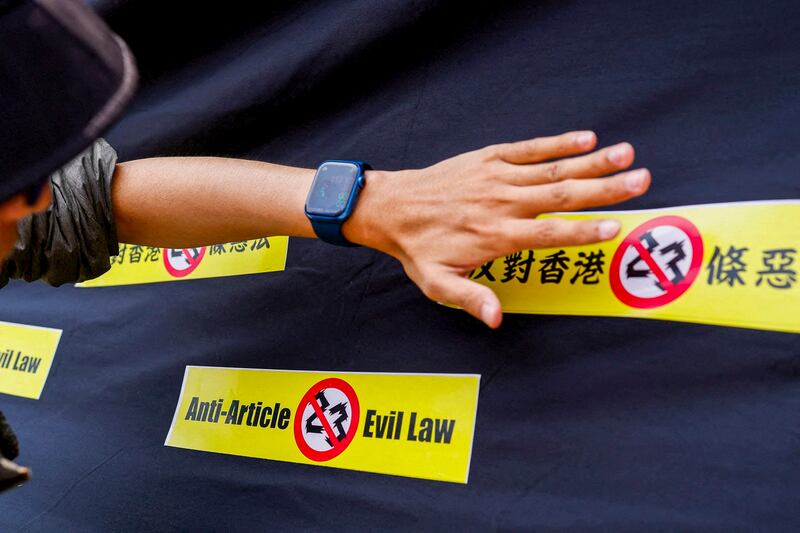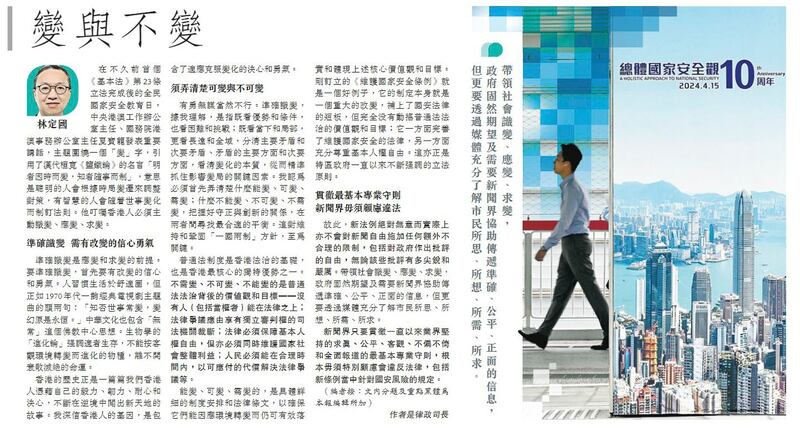A decade ago, journalists in Hong Kong would think nothing of interviewing pro-independence politicians like Edward Leung, who has since been jailed for his views.
But today, such activities could make someone a suspect under two stringent national security laws banning “secession,” “subversion” and “sedition,” journalists and media commentators say.
They aren't convinced by the Hong Kong government's attempts to play down the risks facing journalists under its recently enacted Article 23 security legislation.
Over the past decade, press freedom has gone sharply downhill in the one-time bastion of free speech in Asia as Beijing ramps up its legislation to protect "national security," with a constant expansion of forbidden topics and "red lines" in recent years.
Hong Kong's press freedom ranking calculated by Paris-based Reporters Without Borders has tumbled from 18th two decades ago to 135th.
But officials in China and Hong Kong repeatedly say that journalists are safe to carry out "legitimate" reporting activities under both the 2020 National Security Law and the Article 23 Safeguarding National Security Law, which was passed on March 23.
"The press, if it complies with basic ethics, has no need to worry about breaking the law," Hong Kong Justice Secretary Paul Lam wrote in an opinion article in the Ming Pao newspaper on April 29.
Earlier in the same month, Chinese foreign ministry spokeswoman Mao Ning claimed that "the freedom of press and speech has been fully protected by [Hong Kong's laws] in the 26 years since the handover, and that recent years have seen an increase in the number of international media outlets and journalists in Hong Kong.
Crossing red lines
Joseph Ngan, a former assistant controller at Hong Kong's i-CABLE News who currently lives in the United Kingdom, said Lam's article is highly unlikely to inspire confidence in any journalist still operating in Hong Kong.
"Article 23 itself places restrictions on freedom of speech," Ngan said. "It's so easy for the media to run across these red lines when they're reporting on the news."

"And it's not just about being supervised by the Hong Kong government, or Beijing," he said. "There is inevitably self-censorship due to Article 23, whether that's of the stories picked by media company owners and editors, or by the reporters themselves."
Part of the problem is that the government has never explained exactly what kind of stories could land them in hot water. The wording of the laws is vague, leaving them trying to read between the lines of official denunciations and legal rulings to figure out where the boundaries lie.
Getting it wrong can lead to public denunciation by Hong Kong officials, or even jail.
According to Reporters Without Borders, or RSF, at least 28 journalists have been prosecuted under the 2020 National Security Law. Hong Kong officials have singled out at least seven media organizations for public criticism so far this year -- including the Ming Pao, Bloomberg, the BBC, the Washington Post and The Times -- for their reporting on the negative impact of the Article 23 legislation.
Officials have also sent warning letters to at least seven outlets including BBC, RFA, the Guardian, the Washington Post, The New York Times and Bloomberg over articles the government sees as a security threat, RSF said.
Meanwhile, a large number of Hong-Kong based journalists have reported being followed and surveilled and hundreds of them were forced to go into exile, while at least 900 journalists also lost their jobs due to the closure of pro-democracy media outlets, it said.
Exodus
A number of international media outlets are choosing to leave the city entirely.
Radio Free Asia closed down its bureau in the city in March after being publicly criticized by Security Secretary Chris Tang, citing concerns for the safety of its staff. The New York Times has long since shifted many of its former Hong Kong operations to Seoul.
And on May 3 – World Press Freedom Day – The Wall Street Journal announced it was moving its regional headquarters from Hong Kong to Singapore.
"We are shifting our center of gravity in the region from Hong Kong to Singapore, as many of the companies we cover have done," Editor-in-Chief Emma Tucker said in a letter to staff that was reported by Agence France-Presse.
"Consequently, some of our colleagues, mostly in Hong Kong, will be leaving us," she said.

Veteran media commentator To Yiu-ming said even Chinese officials are more cautious about what they say in Hong Kong these days, while many of the foreign companies who would have been sources for organizations like the Wall Street Journal have already moved their operations to Singapore.
"Leaking state secrets is a very serious crime ... so it's better to move to Singapore and cover Hong Kong from there," To said. "It's also easier to report on mainland China on the ground there, because the stuff you're not allowed to say in China is forbidden in Hong Kong now too."
‘Blatant lie’
Ngan, who was among a number of prominent journalists to leave in the wake of the 2020 National Security Law, now chairs the Association of Overseas Hong Kong Media Professionals, which has called on overseas governments to offer lifeboat schemes to help fellow journalists leaves Hong Kong before they run afoul of its security laws.
"Its censorship of the media shows us that the Hong Kong government doesn't attach much importance to press freedom, so what they say is not convincing at all," he said.
RSF's Asia-Pacific Bureau Chief Cédric Alviani described official assurances that Hong Kong still enjoys freedom of the press as “a blatant lie that does not withstand scrutiny.”
He cited an “unprecedented campaign against independent journalism” that resulted in the closing of eight media outlets and the prosecution for crimes against the state of a large number of journalists, in a statement on the group’s website.
At a May 3 press conference in London, Reporters Without Borders called for the release of pro-democracy media mogul Jimmy Lai, who is currently on trial for "collusion with foreign forces" for printing articles in his now-defunct Apple Daily newspaper, saying his case was "emblematic" of press freedom in Hong Kong today.
"News articles and op-eds are used as evidence in court against press freedom defenders and journalists," RSF said, citing the use of 17 articles as evidence in the sedition trial of two editors-in-chief at the now-defunct Stand News.
Translated by Luisetta Mudie. Edited by Malcolm Foster.
